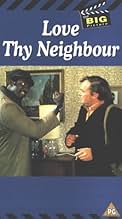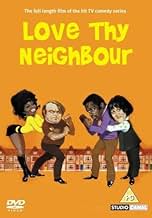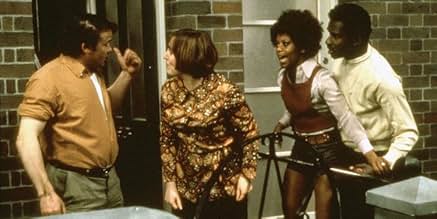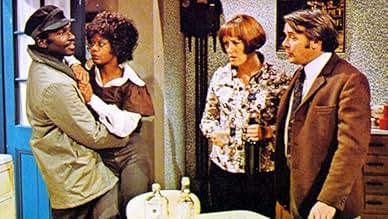Two men who are next-door neighbors constantly battle over seemingly-trivial offenses; on the other hand, their wives are the best of friends. The two couples attempt to win a 'love-thy-neig... Read allTwo men who are next-door neighbors constantly battle over seemingly-trivial offenses; on the other hand, their wives are the best of friends. The two couples attempt to win a 'love-thy-neighbor' competition by lying.Two men who are next-door neighbors constantly battle over seemingly-trivial offenses; on the other hand, their wives are the best of friends. The two couples attempt to win a 'love-thy-neighbor' competition by lying.
- Director
- Writers
- Stars
Andria Lawrence
- Norma
- (as Andrea Lawrence)
John Bindon
- White Groom
- (as John Binden)
- Director
- Writers
- All cast & crew
- Production, box office & more at IMDbPro
Featured reviews
It shows the state of race relations in 1973 that a tv series could have been produced followed by this film. It is a total embarassment about which the film industry should be totally ashamed.
It is no good saying that Jack smethurst's character always comes out second best,his character has to speak such offensive insults that it isdifficult to watch this and bear in mind that the film is supposed to be a ccomedy.
I never watched the tv series,but all i can ask myself is whether people actually watched this film and laughed.
It is unfortunate that racism was still endemic in the entertainment industry. You have the likes of Alec Guiness using dark make up to portray an Indian in A Passage To India.
It is no good saying that Jack smethurst's character always comes out second best,his character has to speak such offensive insults that it isdifficult to watch this and bear in mind that the film is supposed to be a ccomedy.
I never watched the tv series,but all i can ask myself is whether people actually watched this film and laughed.
It is unfortunate that racism was still endemic in the entertainment industry. You have the likes of Alec Guiness using dark make up to portray an Indian in A Passage To India.
Love Thy Neighbour is a strained expansion of a popular 1970s TV Sitcom. It's dealing with race relations between West Indians and White British makes it popular with the humour found in Working Men's Clubs, but the cracks do show.
At times the humour is funny, but very rarely. It's forgettable.
At times the humour is funny, but very rarely. It's forgettable.
It is hard to believe that this passed for mainstream entertainment 50 years ago as this big screen version of the popular long running ITV series contains enough racial slurs, offensive language, bigoted views and inappropriate behaviour to send millennials and the woke brigade into a complete meltdown. By today's standards it is a very problematic situation comedy about two warring neighbours constantly trading insults about their colour, creed and general differences in a game of unpolitically correct one-upmanship which was watched and adored by millions who thought nothing of it at the time.
While the comedy is now out dated and a product of the 1970's it's not quite as offensive as at first it may seem. Sure there are cheap gags, low brow humour and racial stereotypes in abundance but the black characters always give as good as they get from their white counterparts and the humour is spirited rather than oppressive. The white protagonist Eddie Booth often comes off worse as his racial name calling, tyrannical outbursts and small minded attitude is often to his own detriment.
In real life Jack Smethurst and Rudolph Walker were friends but they do what the script asks of them in portraying relentlessly bickering neighbours, often put in their place by their respective wives Kate Williams and Nina-Baden Semper, to make them see the error of their ways. There was never any malice or racial hatred intended in Vince Powell's scripts (who was also responsible for the sitcom Mind Your Language 1977) but it did hold up a mirror to a British society coming to terms with the immigration policy of successive Governments at that time with the integration of ethnic groups moving into working class areas causing some societal and cultural conflict.
I grew up watching the TV series so the comedy here is not as jarring for me and I love it when comedy shows get the big screen treatment, however plot wise this doesn't stray too far from the TV series like some movie versions do, although there are more scenes shown at their factory workplace, but all the elements that made the TV show a success are present here.
Flush from the success of three On the Buses movies Roy Skeggs, the producer of Hammer Films, successfully adapts another British TV sitcom on a low budget with a no frills workmanlike production as Hammer, the company typically known for horror and science fiction, continued to diversify into comedy to compete with the likes of the Carry On series and Confessions films with similar bawdiness and saucy postcard humour, most of which featured well known British comedy actors. Here we have the likes of Patricia Hayes, Arthur English, Bill Pertwee, Melvyn Hayes and Bill Fraser making guest appearances.
The humour in Love Thy Neighbour is certainly not for everyone and anyone under the age of 40 should proceed with caution.
While the comedy is now out dated and a product of the 1970's it's not quite as offensive as at first it may seem. Sure there are cheap gags, low brow humour and racial stereotypes in abundance but the black characters always give as good as they get from their white counterparts and the humour is spirited rather than oppressive. The white protagonist Eddie Booth often comes off worse as his racial name calling, tyrannical outbursts and small minded attitude is often to his own detriment.
In real life Jack Smethurst and Rudolph Walker were friends but they do what the script asks of them in portraying relentlessly bickering neighbours, often put in their place by their respective wives Kate Williams and Nina-Baden Semper, to make them see the error of their ways. There was never any malice or racial hatred intended in Vince Powell's scripts (who was also responsible for the sitcom Mind Your Language 1977) but it did hold up a mirror to a British society coming to terms with the immigration policy of successive Governments at that time with the integration of ethnic groups moving into working class areas causing some societal and cultural conflict.
I grew up watching the TV series so the comedy here is not as jarring for me and I love it when comedy shows get the big screen treatment, however plot wise this doesn't stray too far from the TV series like some movie versions do, although there are more scenes shown at their factory workplace, but all the elements that made the TV show a success are present here.
Flush from the success of three On the Buses movies Roy Skeggs, the producer of Hammer Films, successfully adapts another British TV sitcom on a low budget with a no frills workmanlike production as Hammer, the company typically known for horror and science fiction, continued to diversify into comedy to compete with the likes of the Carry On series and Confessions films with similar bawdiness and saucy postcard humour, most of which featured well known British comedy actors. Here we have the likes of Patricia Hayes, Arthur English, Bill Pertwee, Melvyn Hayes and Bill Fraser making guest appearances.
The humour in Love Thy Neighbour is certainly not for everyone and anyone under the age of 40 should proceed with caution.
What a wonderful gem to find, in 2019. I grew up with the TV series but, never knew there was a follow up movie.
When the series came out I was a tot at 10 years of age however, I could already understand the satire this series depicted, along with "Till Death Do Us Part". Both perfectly depicted life as it was at the time in England.
I could see exactly what the writers were putting up to society, and the cast were the perfect idiom to do so, they were so well matched. They were trying to break down long held barriers between races. To an extent, it worked, it's not there yet.
Jack Smethurst and Kate Williams were already established actors. Rudolph Walker and Nina Baden-Semper were relative newcomers. However, the blend of both, even in the 70's, worked.
The male actors played off each other brilliantly, the female actors played off ecah other because women meet together better tham men do. And that was part of why the series and movie worked, not just because of "colour".
To see faces I hadn't seen in over 40 years, was a joy to behold. To be reminded of the comedy I grew up with, is indescribable, especially in this age of political correctness. This movie was completely incorrect, as it was meant to be (in an age before "correctness".
The multiple storylines that evolved from a simple premise, worked; especially the unexpected love match arriving from an early flight from Trinadad. I won't elaborate, I'll leave that up to the viewer. THAT pulled the movie together, and made it the prefect ending to the TV series, exactly what it all meant in the first place.
Only those of "my" age would know that, Jack Smethurst and Rudolph Walker were actually best of friends. I was one of the lucky ones, who saw Jack being "ambushed" for "This Is Your Life", on his way to dinner, with his wife; and sitting beside him in the car was, Rudolf and HIS wife. For the younger generation, Rudolf Walker, OBE, plays Patrick Trueman in "Eastenders" on BBC TV.
When the series came out I was a tot at 10 years of age however, I could already understand the satire this series depicted, along with "Till Death Do Us Part". Both perfectly depicted life as it was at the time in England.
I could see exactly what the writers were putting up to society, and the cast were the perfect idiom to do so, they were so well matched. They were trying to break down long held barriers between races. To an extent, it worked, it's not there yet.
Jack Smethurst and Kate Williams were already established actors. Rudolph Walker and Nina Baden-Semper were relative newcomers. However, the blend of both, even in the 70's, worked.
The male actors played off each other brilliantly, the female actors played off ecah other because women meet together better tham men do. And that was part of why the series and movie worked, not just because of "colour".
To see faces I hadn't seen in over 40 years, was a joy to behold. To be reminded of the comedy I grew up with, is indescribable, especially in this age of political correctness. This movie was completely incorrect, as it was meant to be (in an age before "correctness".
The multiple storylines that evolved from a simple premise, worked; especially the unexpected love match arriving from an early flight from Trinadad. I won't elaborate, I'll leave that up to the viewer. THAT pulled the movie together, and made it the prefect ending to the TV series, exactly what it all meant in the first place.
Only those of "my" age would know that, Jack Smethurst and Rudolph Walker were actually best of friends. I was one of the lucky ones, who saw Jack being "ambushed" for "This Is Your Life", on his way to dinner, with his wife; and sitting beside him in the car was, Rudolf and HIS wife. For the younger generation, Rudolf Walker, OBE, plays Patrick Trueman in "Eastenders" on BBC TV.
The name Hammer will always be synonymous with horror, however the studio also very successfully produced comedies and Love Thy Neighbour is one of the best known. Based on the TV series about a black and a white couple living next door to each other in early 1970's London, constantly bickering but when they enter a "Love Thy Neighbour" competition they need to get along.
The language here is incredibly racist, thankfully now seen as unacceptable in modern TV/movie making. HOWEVER , when watching LTN it must be realised that back in the 1970's society was far less politically correct. This is a comedy, dated yes but also well made and very, very funny.
Did you know
- TriviaThe south west London street Maple Terrace in Twickenham is home to the Booths (at number 65) and the Reynolds (at 67).
- ConnectionsReferenced in Hammer: The Studio That Dripped Blood! (1987)
- How long is Love Thy Neighbour?Powered by Alexa
Details
- Runtime
- 1h 25m(85 min)
- Aspect ratio
- 1.66 : 1
Contribute to this page
Suggest an edit or add missing content
































